For the first time in history, China and the U.S. recently teamed up for the mixed doubles event at the World Table Tennis Championships (WTTC) Finals to commemorate the 50th anniversary of “Ping-Pong Diplomacy.” Once again, the two countries are standing side by side thanks to table tennis. This is very encouraging for many people, including for Justin O’Jack, an American who has been living in China for most of the last 25 years. “I am very happy to see athletes from the U.S. and China playing together on the same team,” he said enthusiastically. “What’s more, in the spirit of continued friendship between our two countries, this is the first time the World Table Tennis Championships have been hosted by an American city. I only wish I were there to watch the games in person.”
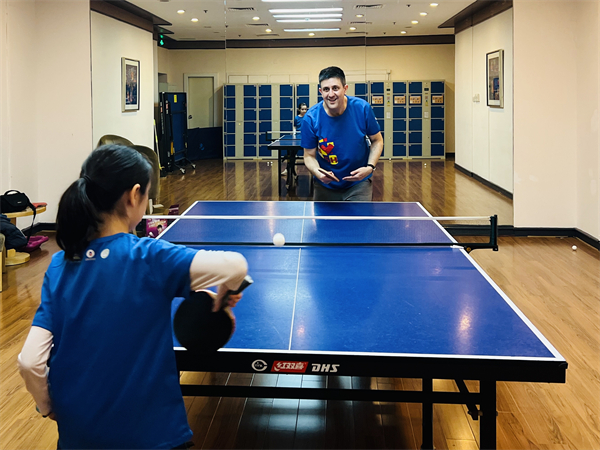
Justin and his daughter play table tennis every week.
Falling in love with ping-pong
Justin, a Shanghai son-in-law, was among a few American expats in Shanghai invited to participate in the ping-pong friendship game in April this year, teaming up with Chinese students from the Shanghai University of Sport, and becoming the next generation to take part in “Ping-Pong Diplomacy.” In less than one month, he went from complete novice to learning all the basics of playing table tennis from his coach and Chinese partner. Having made quite a bit of progress, he soon fell in love with the sport.
Justin recalled with excitement the day of the match, when world champion Wang Liqin demonstrated an on-the-spot pair exercise right in front of him. While watching Wang, who is 1.85 meters tall (6’1”), it dawned on Justin that tall people like himself have a competitive advantage when playing table tennis, which further inspired him to learn the sport.
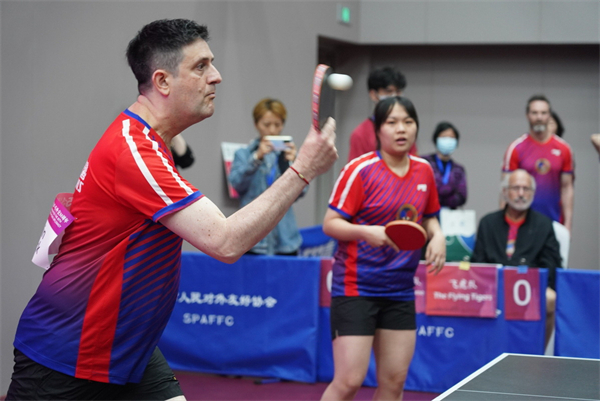
Justin and his Chinese partner at the ping-pong friendship game in Shanghai (April 10, 2021)
During an interview in April, Justin said he wished there could be a similar event held in the U.S. to celebrate the 50th anniversary of “Ping-Pong Diplomacy,” and now his wish has come true at the WTTC Finals.
To learn table tennis, Justin made his first investment in April: buying a decent paddle. After the friendship game, he gave the paddle to his daughter, who is 10 years old. Now, the father and daughter play the game together every week.
Their coach, Vito Guan, is a student from the China Table Tennis College at Shanghai University of Sport. “People from different countries and cultural backgrounds can truly become connected through sports,” he said. “We’ve gained a better understanding of each other’s culture and customs through the process of learning table tennis. We have developed more topics of mutual interest, and both are very happy with the exchange,” said Vito. While appreciating the punctuality of Americans and their willingness to learn, he also hopes he can show the hospitality and conscientiousness of the Chinese people to his international friends. He believes that in the long term, such kind of exchanges can play a unique role in the promotion of friendship between countries.
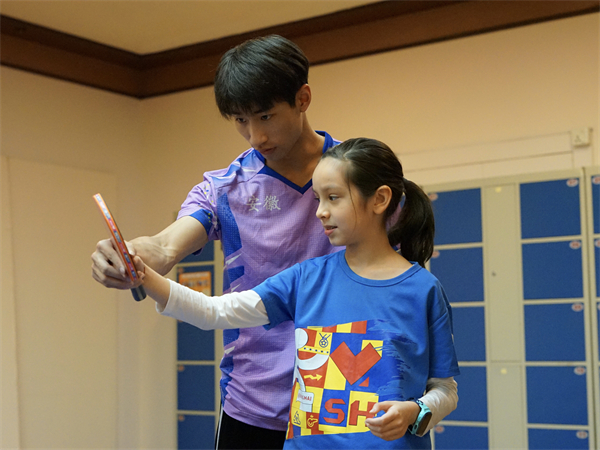
Justin’s daughter learns table tennis from her Chinese coach, Vito Guan.
Promoting Sino-U.S. mutual understanding
On April 10, 1971, the American table tennis team visited China, opening the doors to China-U.S. relations. 50 years later, it is more important than ever to look back and commemorate the legacy of “Ping-Pong Diplomacy,” especially given present bilateral relations between the two countries, said Justin, who is engaged in Sino-U.S. educational exchange.
Justin, who is from California, reflected on how he and his wife, who is from Shanghai, are from different countries and have different cultural and educational backgrounds, but they strive toward common goals in raising their child and doing what is best for their family. Similarly, China and the U.S. share one world and face common challenges, such as climate change, so why not learn from each other’s strengths and cooperate to achieve mutually beneficial outcomes?
Justin also educates his daughter to think with an international mindset. “In terms of her cultural identity, I always try to remind her that she is not half Chinese and half American, but both Chinese and American. She has the best of both worlds,” he said. Once while the family was watching a match on television that happened to be between China and the U.S., he asked her which team she hoped would win. Without hesitation, the little girl said, “I’m cheering for both of them!” Who wins and who loses is not necessarily important to a child. This simple truth is perhaps worth pondering.
Justin, in his capacity as chief representative of University of Virginia (UVA) in China, has been extraordinarily busy since last year. As he explained, after the pandemic broke out many international students from China were unable to travel to the U.S. to study, due in part to visa restrictions. Thanks to the efforts of Justin and his team—and their counterparts at universities in China—those Chinese students have been allowed to begin their studies at Peking University and Fudan University, both very prestigious universities in China, under a credit transfer mechanism between the institutions. “The students were really excited, as Peking University and Fudan University are among their dream schools in China,” said Justin, noting that it is a good example of win-win cooperation.
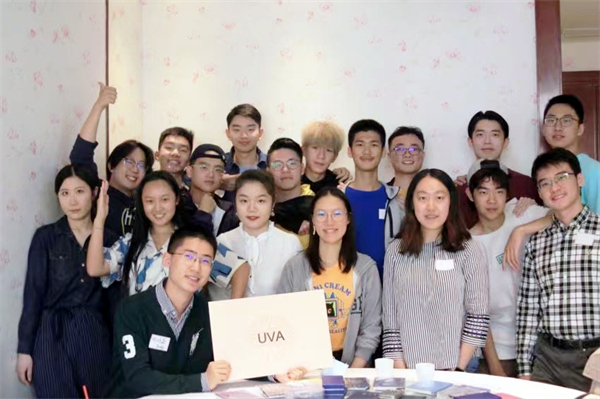
UVA first-year students during their fall 2020 term at Fudan University
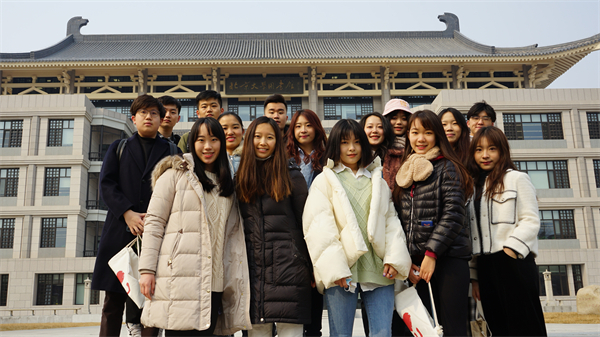
UVA first-year students during their spring 2021 term at Peking University
While introducing UVA, Justin mentioned the University has an excellent intramural table tennis club, which he hopes may have the opportunity to visit China to play ping-pong with Chinese students in the future.
(Photos provided by Justin O’Jack)
